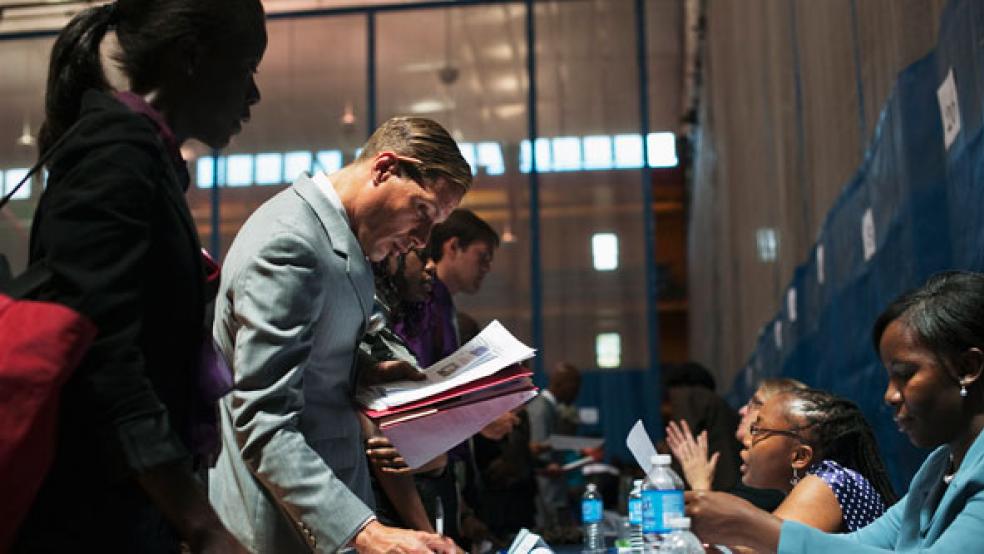The unemployment rate unexpectedly dropped to 7.8 percent in September, reaching its lowest level since President Barack Obama took office and providing a boost to his re-election bid.

The Labor Department said on Friday that employers added 114,000 workers to their payrolls last month, a moderate number, but it said a combined 86,000 more jobs were created in the prior two months than it had previously thought. Other aspects of the report also were strong.
In particular, a separate survey of households found a big surge in hiring. That pushed the jobless rate down by 0.3 percentage point to its lowest level since January 2009, the month Obama took office. Economists had expected it to rise to 8.2 percent.
The drop in the unemployment rate came even as Americans returned to the labor force to resume the hunt for work. The workforce had shrunk in the prior two months.
"There is something in these numbers for everyone. The rise in the participation rate shows somewhat of a real improvement in the labor market," said Omer Esiner, chief market analyst at Commonwealth Foreign Exchange in Washington.
The households survey, which can be very volatile month-to-month, showed employment increased 873,000, but it also showed a rise of 582,000 in the number of Americans who were working part time even though they wanted full-time work.
Tom Porcelli, chief U.S. economist at RBC Capital Markets in New York, said that took a bit of the shine off the report.
"That does not mean this is a bad report, just a ho-hum report," he said.
U.S. stocks opened modestly higher, while prices for Treasury debt fell. The dollar rose versus the yen and the euro.
U.S. interest rate futures slipped as traders bet an improving jobs market could lead the Federal Reserve to back off its monetary stimulus earlier than had been expected.
SPIN DOCTORS
It was the second to last report before the November 6 election that pits Obama against Republican Mitt Romney, and possibly the one that will garner the most attention from voters.
"While there is more work that remains to be done, today's employment report provides further evidence that the U.S. economy is continuing to heal from the wounds inflicted by the worst downturn since the Great Depression," Alan Krueger, chairman of the White House Council of Economic Advisers, said in a statement.
Romney sought to remind voters that the labor market was still far from healthy.
"This is not what a real recovery looks like," he said in a statement. "We created fewer jobs in September than in August, and fewer jobs in August than in July, and we've lost over 600,000 manufacturing jobs since President Obama took office."
A Reuters/Ipsos poll released on Thursday after Wednesday's first presidential debate showed Romney gained ground and is now viewed positively by 51 percent of voters. Obama's favorability rating remained unchanged at 56 percent.
The surprise drop in the jobless rate led former General Electric CEO Jack Welch to suggest in a tweet that the numbers had somehow been doctored. "These Chicago guys will do anything," he said in a reference to Obama's campaign operation. Welch is a Reuters columnist.
Labor Secretary Hilda Solis told CNBC that the notion the jobless rate was manipulated for political purposes was "ludicrous."
FED LIKELY TO KEEP FOOT ON THE GAS
Persistently poor labor market conditions led the Fed in September to announce a plan to buy $40 billion worth of mortgage-backed securities each month until it sees a sustained turnaround in employment.
Despite the brighter signs on the jobs market, the central bank is unlikely to back off its stimulus anytime soon. After its September meeting, it said it planned to keep an easy policy in place for "a considerable time" after the recovery strengthened.
The Fed's ultra-easy stance has started to free up credit, supporting retail sales and construction.
Retail employment rose by 9,400, while construction added 5,000 jobs. Record low mortgages rates on the back of the Fed's monetary stimulus have spurred homebuilding.
Government payrolls rose 10,000 after increasing 45,000 in August.
However, temporary help jobs, which are often seen as a harbinger for permanent hiring, fell 2,000, and manufacturing payrolls dropped 16,000, a second straight monthly decline.
Average hourly earnings rose 7 cents last month, which could support spending, and the length of the average work week also increased slightly, another sign of strength.




